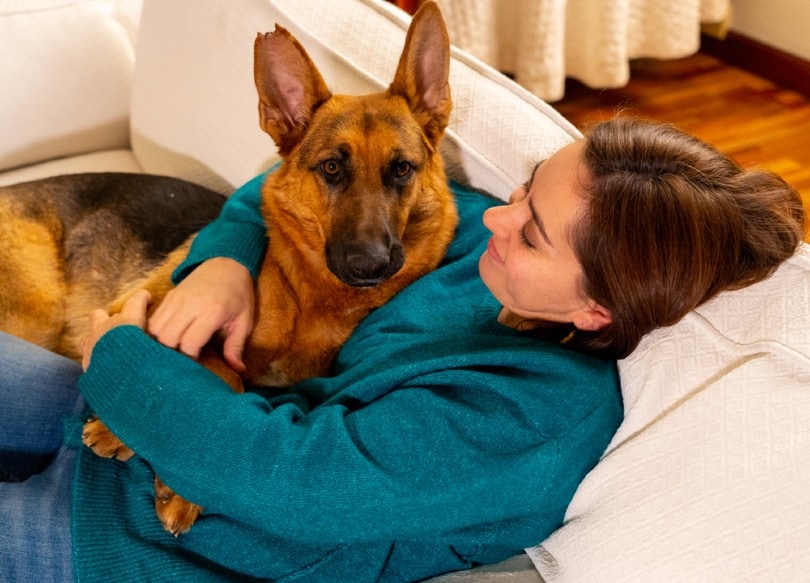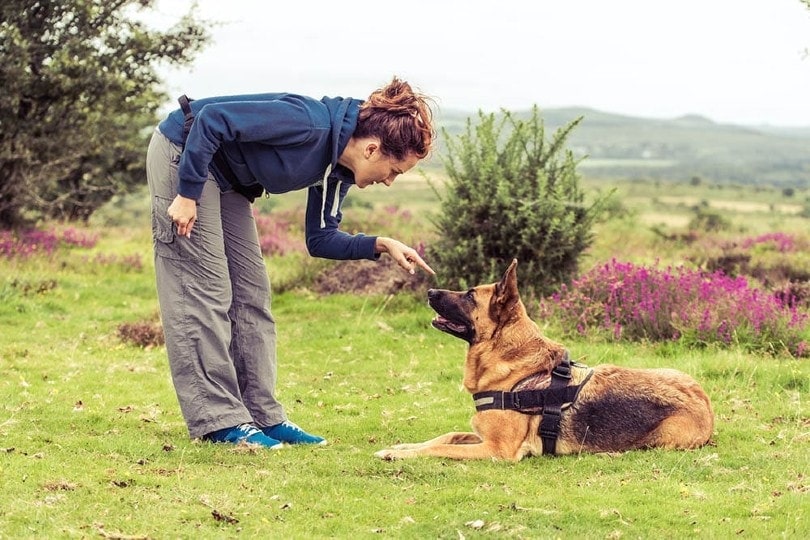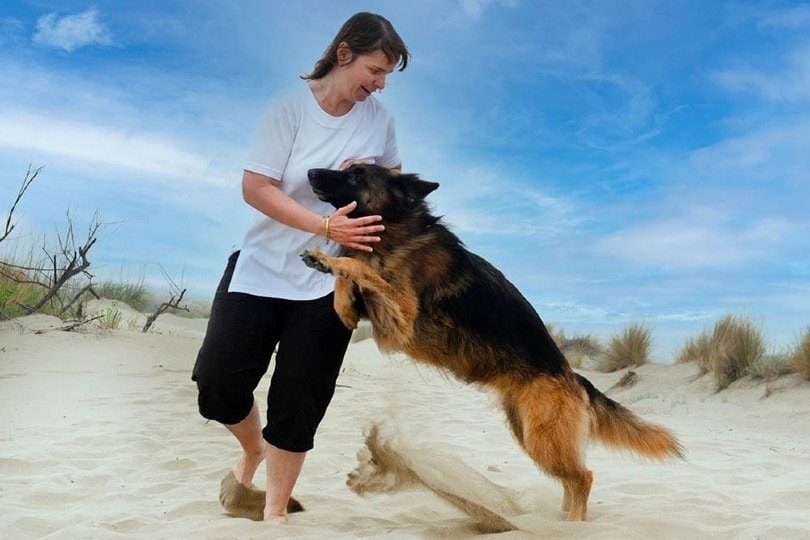15 German Shepherd Myths & Misconceptions: Fact vs Fiction
Updated on

German Shepherd Dogs (GSDs) are undoubtedly a common breed but that doesn’t mean they aren’t as likely to be the victims of misinformation as anyone else.1
While many of the myths about this breed are silly and harmless, others can be quite damaging. If a dog has an unearned reputation for viciousness, for example, it could cause people to stop adopting them, leading to more animals languishing in shelters and eventually getting euthanized.
Here, we look at common myths and misconceptions about this wonderful dog, in the hopes that some of them might (mercifully) be put to rest.
The 15 Myths & Misconceptions About the German Shepherd
1. Myth: German Shepherds Are Inherently Aggressive
Fact: It’s a bit understandable how this myth could come to be, as anyone who’s seen a German Shepherd police dog take down a suspect can attest. If not properly trained and socialized (or if trained to be an attack dog), German Shepherds can be vicious — just like nearly any other breed.
According to the American Temperament Test Society, German Shepherds are roughly as aggressive as Golden Retrievers, and no one accuses those dogs of being terrifying.2 As long as you take the time to train and socialize your German Shepherd, they should be just as safe and loving as any other dog that you could bring home.

2. Myth: German Shepherds Can’t Be Trusted Around Kids
Fact: This myth likely stems from the first one; after all, if you think that these dogs are natural loose cannons, why would you trust them around your kids? Again, though, there’s nothing inherently aggressive or vicious about German Shepherds compared to other breeds.
That said, a German Shepherd is capable of doing a great deal of damage to a child if they attack, so you should never leave one unattended around your kids (this goes for all breeds of dog, however). Also, supervising your kids with the dog is as much about ensuring that your kids don’t provoke the dog as it is about keeping the pooch from getting out of line. Many children are never taught how to behave around animals, leading to tragic (and utterly preventable) consequences.
3. Myth: German Shepherds Are Inherently Protective of Their Owners
Fact: German Shepherds were bred to protect livestock from animal attacks, so they were expected to fend off pretty fierce competition, including bears, wolves, and lynxes. Even today, experts will tell you that German Shepherds are among the best guard dog breeds on the planet. You can see them hunting down drug traffickers and murder suspects nearly every time you turn on the news. So, they’ll definitely protect you if a bad guy barges through the front door, right?
While a protective streak has been bred into these dogs, every pup is an individual, and you’ll find cowardly German Shepherds just like in any other breed. If you want your dog to spring into action when there’s a threat present, you have to train them to do so, and that includes teaching them how to identify a threat. After all, you don’t want them running out, teeth blazing, just to protect you from the Girl Scouts selling cookies door-to-door.

4. Myth: German Shepherds Are Inherently Aggressive Toward Other Dogs
Fact: Call this one a half-truth. There is some evidence that shows that German Shepherds have a higher level of aggression toward other dogs than many other breeds, but that’s understandable, given their history.3 After all, if they’re guarding a flock of sheep, an unknown dog is more likely to be a predator that needs to be driven away rather than a friend that should be welcomed with open paws.
That doesn’t mean German Shepherds can’t be trusted around other dogs, however; it just depends on how well you train and socialize the dog. A well-adjusted German Shepherd can be extremely playful and welcoming to all sorts of animals, including other pups, but you can’t just assume that such behavior will happen on its own. From the moment that you bring your new German Shepherd home, you should be working on teaching them how to behave around people and animals. If you don’t, then your dog’s aggressive behavior is on you.
5. Myth: Female German Shepherds Aren’t Dominant or Aggressive
Fact: The truth of this statement largely depends on how it’s phrased. Many people suggest that female German Shepherds are inherently submissive, and some go as far as to say that they’re incapable of being dominant or aggressive. While females may be a bit less dominant than males, they’re just as capable of showing negative behavioral traits as their male counterparts.
Therefore, you shouldn’t think that you can just adopt a female German Shepherd and all your behavioral problems will be solved. A poorly trained female can be just as dangerous as a poorly trained male, so you should start working with your little girl pup as soon as you bring her home. In fact, females can be even more aggressive than males in certain situations, especially if they’re protecting a litter of puppies.

6. Myth: German Shepherds Don’t Need Training
Fact: Some people see how well German Shepherds perform in obedience trials or as police dogs and assume that they just come that way and that these dogs will just instinctively know how to behave. Nothing could be further from the truth, however.
Those well-behaved German Shepherds that you see all over the place are the products of hours and hours of deliberate training. They didn’t come like that right out of the box — someone had to teach them the proper way to behave. Now, you don’t necessarily need to dedicate multiple hours a day to training your dog (unless you want them to hunt down bad guys for you), but you will need to give them regular obedience work if you expect them to be well-mannered.
7. Myth: You Can’t Train a Full-Grown German Shepherd
Fact: This myth isn’t necessarily limited to German Shepherds, as some people claim that it’s impossible to train an adult dog of any breed (hence the expression about teaching old dogs new tricks). However, we suspect that while it may be true that those people can’t train an adult dog, it’s more of a reflection on them than their pup.
German Shepherds are whip-smart and eager to learn, regardless of their age. If you put in the time and effort, you can see tremendous results from training your dog, even if their puppy years are well behind them. That said, it may be true that older dogs are more likely to have bad habits that you’ll need to break, but it’s certainly not impossible to do so.

8. Myth: You Can Go All-Out Training a German Shepherd Even When They’re Puppies
Fact: This myth is the flip side of the one preceding it. While it’s true that you can teach a German Shepherd at any age, not all tricks and commands are suitable for your dog at certain times of their life. You need to be especially careful before they’re about 2 years old, as well as when they become senior dogs.
The problem is that their musculoskeletal system doesn’t come fully formed (they have to grow, after all), and if you put too much strain on it too soon, you can cause serious damage to their bones and joints. You shouldn’t force a puppy to climb too many stairs, and avoid playing with them on hard surfaces like concrete until they mature. The same goes for senior dogs, but for different reasons — their aging bodies simply can’t handle the strain, making them more likely to suffer an injury.
9. Myth: All German Shepherds Have Sensitive Stomachs
Fact: This is a strange yet persistent myth about the breed, and we were unable to find much in the way of concrete evidence to support it. Still, there’s a great deal of anecdotal evidence from owners who say that their German Shepherds have more sensitive stomachs than other breeds and that they’re especially prone to diarrhea.
So, while we can’t say one way or the other whether German Shepherds are more prone to having a sensitive stomach than other breeds, we can tell you that not all German Shepherds have tricky tummies. It’s just as easy to find owners who swear that their GSD could eat a tank in one sitting as those who are constantly complaining about runny poop. That said, it’s probably not a bad idea to monitor what your dog eats, just to make sure everything is being processed correctly.

10. Myth: All German Shepherds Will Get Hip Dysplasia at Some Point
Fact: This is another myth that’s more misleading than blatantly false. The breed is indeed more prone to hip dysplasia and other joint injuries than many other dogs, but there’s no guarantee that any particular dog will suffer from the disease. In fact, according to the Orthopedic Foundation for Animals, around 20% of German Shepherds will have hip problems — a troubling number, to be sure, but a far cry from 100%.
While you shouldn’t let this myth deter you from adopting a GSD, you shouldn’t ignore the possibility that your dog will be affected either. You should take them in for regular vet visits so the doctor can evaluate their hips, and be sure not to let them become overweight, as that can exacerbate the effects of the disease (and cause a whole host of other problems).
11. Myth: You Can’t Keep a German Shepherd in an Apartment
Fact: While this myth is false, it is true that having a German Shepherd in a smaller home (especially one without a backyard) will present a few challenges. The bottom line, however, is that as long as you provide your dog with plenty of exercise and mental stimulation, they don’t care where you live.
If you do want to get one of these dogs for your apartment, you’ll need to be extra diligent about walking them often and providing them with more challenging exercises every day. It would help if you lived near a big park, but things like obedience training and playing certain games can all be done in cramped spaces, so feel free to bring home your new best friend to your apartment.

12. Myth: You Should Shave Your German Shepherd in the Summer to Help Keep Them Cool
Fact: This is a well-meaning misconception that usually ends up backfiring, sometimes in severe ways. If you’ve ever been around a German Shepherd, you probably noticed that they have a double coat. Double-coated dogs actually need all that hair, as the undercoat serves as insulation, which helps keep them cool in the summer and warm in the winter.
If you shave off your dog’s fur, they’ll find it harder to beat the heat, increasing their risk of heatstroke, sunburn, and other maladies. Also, when the hair grows back, there’s a higher risk that your dog will suffer ingrown hairs or that one of their layers will grow back improperly, giving your dog a patchy appearance. If you’re worried about your GSD in the heat, bring them indoors, and always be sure to give them plenty of fresh water.
13. Myth: You Won’t Be Able to Bond With an Older German Shepherd
Fact: The thinking behind this one is that German Shepherds bond so closely with their original owners that they don’t have any room in their hearts left for anyone else. While it’s true that these dogs do become closely paired with their owners, they can still form new bonds with other people — their hearts have a limitless capacity for love and affection.
This myth is dangerous, though, because it makes it less likely that people will bring an older dog home from the shelter, for fear of not having a good relationship with them. Sadly, older dogs are less likely to be adopted (and therefore, more likely to be euthanized) than puppies, even though they make absolutely wonderful companions. They’re less destructive and energetic, many have already been trained, and they’ll be eternally grateful to you for liberating them from the shelter. What’s not to love?

14. Myth: You Don’t Need to Take Any Precautions With a Well-Trained German Shepherd
Fact: Even the most diligent owners can make mistakes with their dogs, and some people trust their German Shepherds way too much. Whether it’s allowing them to roam off-leash because you’re so confident in your ability to recall them or leaving them unattended with small children, these errors of overconfidence can have tragic results for both you and your dog.
It’s important to remember that these dogs are still that: dogs. They’re largely driven by impulse and instinct, and while you can train that out of them to some degree, you’ll never fully eliminate it. As a result, you should keep a close eye on them around children, you should keep them on a leash when out in public, and you shouldn’t let them roam around outdoors unsupervised.
15. Myth: Alsatians and German Shepherds Are Different Breeds
Fact: This myth isn’t nearly as important to dispel as some of the others on this list, but it’s still a bit annoying. Many people will insist that the Alsatian and German Shepherd are two completely different breeds, but that’s not the case: It’s the same dog with two different names.
The reason that this naming split happened involves the two World Wars that were fought in the 20th century. Anti-German sentiment was high in the United Kingdom and many other places, which resulted in fewer people being willing to adopt a dog with a German-sounding moniker. This led many people to start referring to the breed as “Alsatians” instead, but only the name changed, not the dog. Not many people still refer to these dogs as Alsatians, but they’re still out there.

The Truth Is, German Shepherds Are Great Dogs
While German Shepherds may not be ideal for every owner, they’re still fantastic dogs, and you’d be lucky to have one by your side. It’s just a shame that there’s so much dangerous misinformation out there about the breed, as it can make people less likely to give one of these pups a chance.
Fortunately, you’re now equipped with the tools necessary to debunk some of the most common myths that you’ll encounter about German Shepherds. Keep in mind, though, that while facts can change people’s minds, they’re not nearly as effective as an encounter with a sweet, loving, well-behaved German Shepherd.
See also:
- 25 Hilariously Relatable German Shepherd Memes
- 5 Reasons Why Your German Shepherd Follows You Everywhere
Featured Image Credit: Callipso, Shutterstock












